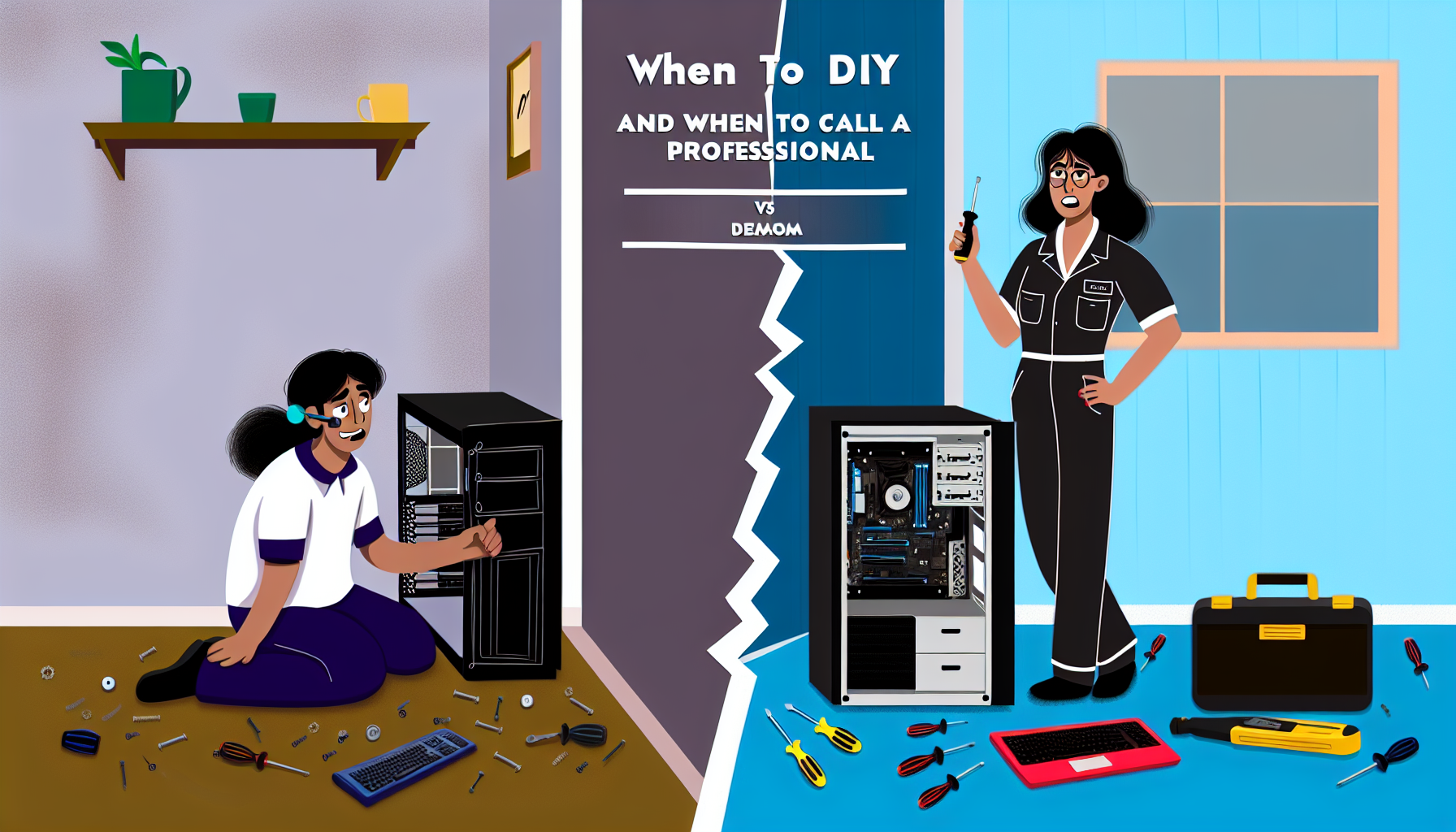In today’s tech-driven world, most of us rely on our computers for various tasks, from work to entertainment. However, when something goes wrong, a common question emerges: should we fix it ourselves, or should we call in a professional? Understanding the intricacies involved in computer repairs can help you make an informed choice, ultimately saving you time, money, and frustration.
The DIY Approach: Benefits and Risks
Benefits of DIY Repairs
-
Cost Savings: One of the primary motivators for attempting a DIY repair is the potential to save money. Professional services can often be expensive, whereas DIY can often be accomplished with minimal expense.
-
Learning Experience: Tackling a repair on your own can be an incredible learning opportunity. You’ll not only gain practical skills but also a better understanding of how your device functions.
- Time Control: If you’re in a rush, doing it yourself may be faster than waiting for an appointment with a technician. Depending on the issue, you could have your machine back up and running in no time.
Risks of DIY Repairs
-
Risk of Damage: Computers are intricate machines, and without the right expertise, you may inadvertently cause more harm than good. This can lead to additional costs and time.
-
Warranty Voidance: If your computer is under warranty, DIY repairs can often void that warranty, leaving you without support if additional issues arise.
- Time Consuming: While DIY repairs can sometimes be faster, they can also end up taking much longer than anticipated, especially if you run into unforeseen obstacles.
When to DIY
Simple Software Issues
Many minor software problems can be resolved independently. These include:
- Virus/Malware Removal: Using trusted antivirus software, many users can handle basic malware removal.
- Operating System Glitches: Issues like an unresponsive application or minor system bugs often don’t require professional assistance.
- Driver Updates: This is generally a straightforward process and can often improve system performance.
Basic Hardware Fixes
Certain hardware issues can also be approached as a DIY project:
- Replacing RAM: Upgrading RAM is one of the easiest upgrades and can significantly enhance performance.
- Swapping Out Hard Drives: With the right tools and tutorials, replacing a hard disk drive (HDD) with a solid-state drive (SSD) can yield large benefits in speed.
Routine Maintenance
Regular maintenance tasks can also fall under the DIY umbrella:
- Cleaning Dust Build-up: Dust accumulation can lead to overheating. Cleaning out the case can enhance performance and longevity.
- Cable Management: Tidying cables not only improves aesthetics but can also enhance airflow.
When to Call a Professional
Major Hardware Issues
In many cases, hardware problems require specialized expertise:
- Motherboard Repairs: Issues related to the motherboard can be complex and are best handled by professionals.
- Power Supply Problems: Diagnosing and replacing power supply units can be dangerous if you lack electrical knowledge.
- Screen Repairs: Laptop screens can easily break, and repairs often require specialized tools and parts.
Complex Software Problems
Certain software issues are often beyond the capabilities of most users:
- Operating System Reinstallation: While some may manage it, reinstalling an OS can be tricky and should be approached with caution.
- Network Configuration: If you’re facing connection issues that involve intricate settings and configurations, a professional’s help may be warranted.
Data Recovery
If you lose crucial data, relying on a professional might be necessary:
- Hard Drive Failures: If your hard drive fails, DIY recovery attempts can oftentimes result in permanent data loss. Professionals have the tools to recover data in a secure and controlled manner.
Warranty and Liability
If your computer is under warranty or you’re dealing with sensitive data, it’s often best to have a professional handle any repairs to avoid breach of warranty or potential data loss.
How to Determine the Best Course of Action
Before making a decision, evaluate the following factors:
-
Your Skill Level: Be honest about your mechanical and technical abilities. If you’re unsure or lack experience, calling in an expert may be the safest choice.
-
Time Constraints: If you need your computer fixed urgently and can’t afford to spend several hours—or days—on a repair, it’s best to consult a professional.
-
Budget: If you’re on a tight budget, and the issue seems straightforward, a DIY repair may be worthwhile. Just remember to factor in the potential costs of further damage.
- Risk Assessment: Assess how risky the situation is. If losing your data could have catastrophic consequences, it’s safer to involve a professional.
FAQs
Q: How can I determine if my computer issue is hardware or software-related?
A: Start by observing the symptoms. Software issues usually manifest as glitches or application errors, while hardware problems often present as physical obstructions, crashes, or startup failures. Booting your computer in safe mode can also help isolate software-related issues.
Q: What tools do I need for DIY repairs?
A: At a minimum, you should have screwdrivers (usually Phillips and flat-head), a static-free workspace, zip ties for cable management, and possibly software tools for virus scanning and performance analysis.
Q: Can I trust online tutorials for DIY repairs?
A: Many online tutorials can be helpful, but it’s crucial to ensure they come from reputable sources. Platforms that have user feedback and follow a clear, step-by-step format are generally more reliable.
Q: How do I find a trustworthy professional for computer repairs?
A: Look for certifications, read online reviews, and ask for recommendations from friends or family. It’s also wise to obtain quotes and understand the warranty on any repairs performed.
Q: Is it advisable to attempt data recovery myself?
A: Unless you are highly experienced, attempting DIY data recovery can lead to permanent loss. Seeking a professional service is usually advisable to safely recover sensitive information.
In conclusion, navigating the computer repair dilemma involves a careful assessment of the issue at hand. Understanding your own skills and the complexity of the problem can help you find the right balance between DIY solutions and professional services, ensuring your device remains reliable and efficient.


